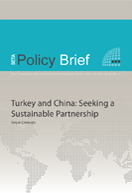Turkey and China have forged a good economic and political relationship in the current decade. Both countries provide great economic, political, and strategic opportunities for each other in their own regions. Turkey and China have forged a good economic and political relationship in the current decade. Both countries provide great economic, political, and strategic opportunities for each other in their own regions. Despite Ankara’s effort to push for a more integrated Uyghur community in Xinjiang under the Chinese Administration, the current difficulties transformed the issue into a problem area between China and Turkey. Turkey’s reiteration of its one-China policy may motivate China to display certain signs of improvement on the conditions of the Uyghur people. There is still considerable need to strengthen the relationship between Turkey and China and transform it into a strategic partnership. Realization of this prospect requires more systematic effort from both countries.
Recent History of Turkish-Chinese Relations Turkey recognized the People’s Republic of China (PRC) on August 5th, 1971 as the sole legal representative of China. While the1970s and 1980s were marked by low levels of exchanges between China and Turkey, the bilateral relationship gained a new momentum and form after the radical transformation in the geopolitical structure of Central Asia. It was the collapse of the USSR (The Union of Soviet Socialist Republics) and the emergence of newly independent Turkic States (Azerbaijan, Kazakhstan, Kyrgyzstan, Uzbekistan and Turkmenistan) that enabled Turkey to re-discover Central Asia in its foreign policy in that region. The Turkish public emotionally welcomed the newly born Turkic republics and began to pay more attention to Turkic and Muslim groups living in the Russian Federation and Xinjiang (Eastern Turkistan)1 region of China.2 However, enormous and unexpected Turkish public interest toward non-independent Turkish peoples living in Russia and China in the first half of the 1990s consequently made Moscow and Beijing more suspicious of Ankara’s intentions. As a result, Russia and China displayed a negative attitude against Turkish policy toward Central Asia and the Caucasus. The initial emotional welcome for the Turkic world has been followed by an adoption of a more pragmatic regional policy by Ankara due to certain economic, political, and strategic shortcomings. Since the mid-1990s, Turkey has pursued a more cautious diplomatic policy toward Central Asia instead of an assertive policy, and tried to improve relations with Russia and China. In this respect, Turkish officials began to pay more attention to the Chinese authority’s stance on Xinjiang/Eastern Turkistan. The new Turkish regional policy was warmly welcomed by China. This pragmatic shift found its positive responses within a short time, such as the speech delivered by the Chinese Ambassador to Turkey, Wu Koming, on February 16th, 1997, which emphasized that Turkey and China’s relations were very good politically and both governments had a very respectful stance on one another’s territorial integrity. The Scope of Bilateral Relations Turkey revised its policy toward China in 1997 because of certain political, economic, and security concerns. At that time, Turkey was going through its own domestic political instability, which was coupled with a sense of international isolation. In this context, Turkey began to have a more problematic relationship with some of its traditional allies, particularly because of the increasingly harsh criticism of Turkey by the EU and the US, as they were accusing Turkey of










